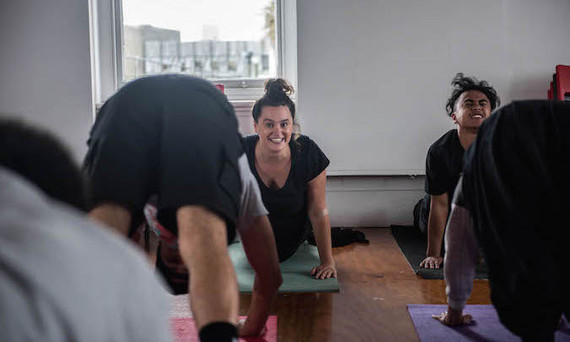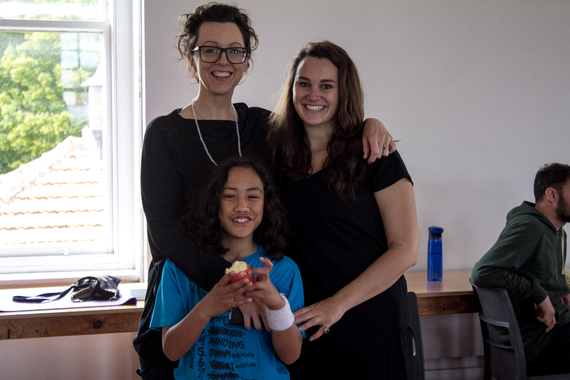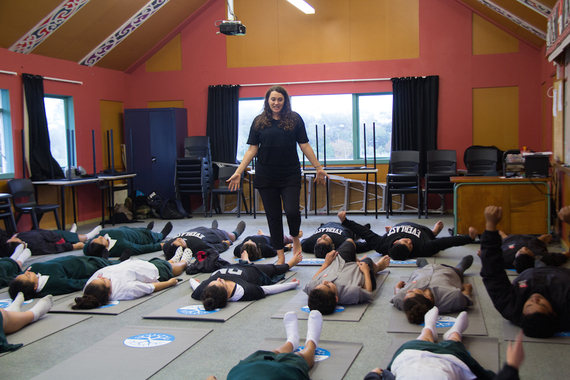
For the last eight years Kristina Cavit has worked with children from marginalised communities, who often face the effects of poverty, including trauma and abuse. After volunteering with Latin American not-for-profit Nuestros Pequeños Hermanos (NPH) following the 2010 Haiti earthquake, helping youth who had been orphaned and abandoned, she returned to Auckland, New Zealand and set up a local NPH office to facilitate fundraising in support of the umbrella group. She also helped to grow Nga Rangatahi Toa, an NZ youth organisation, and recently launched the Kindness Institute, which offers classes and training in mindfulness and yoga.
Classes are designed to help goers address a wide range of needs, from conflict resolution and stress reduction to developing empathy and compassion. The practice is primarily modelled on the work of California-based guru Byron Katie, and works on a sliding scale - so that those who can afford to pay subsidise classes for those that can't. I interviewed Kristina for Impolitikal.
Can you share a bit about your background and what led you to start the Kindness Institute?
One reason was the work that I have been doing over the last eight years with marginalised communities, mainly working with marginalised youth who suffer the effects of extreme poverty in Latin America, and urban poverty here in Aotearoa, and just seeing the difference between those who have emotional self-regulation tools, resilience, self-awareness, self-compassion, stress management tools, and those who don't. Those who have never been around anyone who talks about emotions or stress, and who are taught that vulnerability is weakness, getting in touch with how you are feeling is a weakness. Just seeing a huge difference in people with and without those tools and how, no matter what adversity we face, if we have those tools we can more easily overcome challenges than those without. I've been using different education models and techniques of practices to help young people who have suffered a lot of adversity - and using mindfulness and yoga, and also the work of Byron Katie really has opened up these kids' worlds in a way that I could never have imagined.
Last year I went on a research trip throughout the US looking into stress reduction and mindfulness from some different institutions. I studied with the Jon Kabat-Zinn Mindfulness Based Stress Reduction Programme - he's the guy that has really brought a mainstream approach to mindfulness - and worked with A More Holistic Life Foundation, who are delivering just insane outcomes and support for youth living in urban poverty in Baltimore, Maryland. They are working right in the hood, they're from the hood and a lot of the kids that they are working with are suffering PTSD just from living in that area. They are living in the middle of the warzone. These guys have made yoga, and meditation, and mindfulness cool. And they have completely changed the community. The work that they are doing is revolutionary. A lot of my work with the Kindness Institute, the model is based on their work; they have been researched by Johns Hopkins medical school and Penn State and they are supported by Harvard Medical School, just because they are having such outstanding outcomes in changing the community. I've done training with them, have their support and the Kindness Institute work combines their work with mindfulness-based stress reduction, and also the work of Byron Katie.
My dream for the Kindness Institute is that every kid in Aotearoa will be a part of this programme and will receive these tools. I remember at one of my training programmes a Harvard professor who was working with those Baltimore boys came and gave a talk and he used the example of when brushing your teeth wasn't the norm, and they start figuring out the links between lack of dental hygiene and an increase in illness and disease and they decided to make it a national school programme, of teaching kids how to clean their teeth. I would love for yoga, mindfulness, stress reduction, whatever it is that helps you connect to what you are feeling and why and how to move through it, I would love for that to become a programme that we taught in schools or alternative education (AE) wherever you are, wherever we can find you. And that it becomes a part of our culture and that parents start sharing that knowledge with us so it becomes another habit.
What sort of programmes do you run?
The main focus, the kaupapa is "supporting marginalised communities" and particularly rangatahi, or youth. As I mentioned, I want to get the programme into schools, so we can reach everyone. We are working with Onehunga High School, who have taken us onboard for a pilot project and that's me and three amazing mentors, friends of mine, facilitators, people who are just amazing working with youth, and also share the same vision. We are all volunteering doing this, at the moment. We come together every Wednesday and we work out of Onehunga High. Over the last two years I've been planning the project and how we are going to do it and what it is going to look like. I am the Director of Mindfulness at Nga Rangatahi Toa as well, so I'm still working with those rangatahi there, and we will be starting a programme soon, piloting for alternative education, how we can hopefully develop a programme and get some good research and evidence behind it that we can roll out to kids in AE, which is kids that have been kicked out of school. Youth not in any education, employment or training at all.
So, extremely marginalised youth who would benefit hugely from this programme and from what we have seen so far just really love it and I think that comes down to having a good time as well as sharing something that is so beneficial. We keep it fun and don't keep it too formal when it doesn't need to be. And again, just creating that safety and vulnerability, and the kids knowing that we are going to be there every week - we are always going to be there for them and we are not going to abandon them. That's a big thing at NPH, that they know that I'm always going to turn up and also that we are not their teachers, we are not their parents, that they can talk to us about anything. We will support them holistically in anything they need that's going on in their lives. Just starting to be that person who walks with them through their lives and not just another person who turns their back but actually a trusted adult who believes in them and will support them through whatever it takes is a huge part of our kaupapa.
We really think what we are doing has huge scalability potential as well, and I think there is a real universal need for mindfulness, wellness, stress reduction. It's particularly impactful for marginalised youth but is equally applicable to individuals, workplaces who can pay for the service. The Kindness Institute is a social enterprise, so these similar programmes are provided to paying customers and those profits fund people who can't pay for it and need it most. The other programmes we run are workplace programmes - mindfulness and wellness coaching, and leadership workshops in organisations and workplaces. Individual coaching, one-on-one coaching and also running classes that fundraise to fund a social enterprise model of what we are doing.
Have you had any personal experiences that have motivated you to pursue mindfulness?
I started the Kindness Institute because this work has changed my life hugely, and seeing how simple and gentle these techniques are I realised how easy they would be to share and support other people. And just seeing how many around me - friends, family, the kids I work with - how it just really supported and improved their lives as well. Over the years I have done a number of retreats, some programmes and therapies with mixed results. In 2011, after I finished up helping out at NPH in the Dominican Republic after the Haiti earthquake and I was just quite stressed and overwhelmed after working 24/7 in that environment, I went to a yoga ashram and I found out about the work of Byron Katie and it really fascinated me the freedom that I felt from just doing such a simple process. From then on, whenever I had a tough time or a stressful moment, I pull out those papers and use them to support me in coping. For years, and I have only really realised this recently from doing this work, I thought I was pretty sweet; I had my shit under control, managed my emotions. I thought I was a pretty chill kind of person, levelheaded - turns out I wasn't so.
What motivated you to set NPH up in New Zealand? What does this work involve?
When I finished university I really wanted to learn Spanish and so I went to Spain, then I went to South America and I spent this day in the slum in La Paz in Bolivia. I met this 11 year-old girl who was hanging off the arms of men like 20, 30 years old and she was super high, coked out, and I discovered that she'd been kidnapped by these guys or somehow forced into an addiction and prostitution at 11 years old. It was a real wake-up moment for me. My world opened up and I just thought, what are we doing to our human family that our children are being treated this way? I knew then that I wanted to support to whatever extent I could these kids. So I stayed in South America, found out about NPH - a friend had worked at the orphanage in Haiti, there are 9 orphanages in 9 countries, supporting almost 4,000 kids. They are not really orphanages, they are family homes for children who have been orphaned or abandoned, so when they come to NPH they are not adopted out, it's a safe, loving family environment where they are given all the love and the opportunities possible, and that's what I really love about it.
It just got to the point where we had kids turning up that we needed to support that had nowhere to go. Literally, nowhere to go - living on the streets, living in abusive, awful situations. The kids that we took in were classified by the government as kids that wouldn't survive. We had kids turning up, and we didn't have the money. I just thought the best thing I could actually do would be to come home and start an office here to send financial support to help these kids that I love so much. And to help this kaupapa that I believe in wholeheartedly. I'm really proud to have grown the organisation and I have hired someone else, who has taken over as the director, and I am on the board. We raise funds to support our orphanages, we mainly support Peru and Bolivia. I also did a trip back to the Dominican Republic last year, and to Mexico. We take volunteers over to orphanages to volunteer short-term and also we have a long-term programme where people with certain specific skills go and volunteer for a year. You don't have to pay, most volunteer programmes are quite expensive and some are very expensive, but in this one they actually pay you and you just have to get there. If people are interested in volunteering abroad this is the programme I would recommend hugely. Last year I did yoga and mindfulness in Mexico and the Dominican Republic and they have just asked to me come and train all of their staff in how to do this work.
What are some simple things that people can do to introduce mindfulness into their lives if they aren't able to come to classes?
You can go to my website - there is a free meditation on there, and I will be putting new ones up there for free for anyone who is keen. There's a really amazing tool I'd love to share called The Three Kinds of Business that has blown my mind and helps me whenever I am stressed. I guess a good place to start is identifying what is stressing you out the most. Rather than ignoring it, or suppressing it, to actually sit with that and look at that and begin to develop some self-awareness around why that might be. How it affects you, where your mind goes, and how you can look at it from another perspective. As I've said, the work of Byron Katie is really helpful, and all her stuff is free online. She has free worksheets and actually a free 24-hour helpline that people can call to do the work with certified facilitators, that is just incredible. There are some really great free apps you can download, lots of people tend to like Headspace, or Calm. But the final thing I would say, if you want to feel less stress: start with your breath. Start learning how to breathe, connecting to your breath because breath is really life, is everything. Learning to breathe properly can really change your life and is a great place to start.

